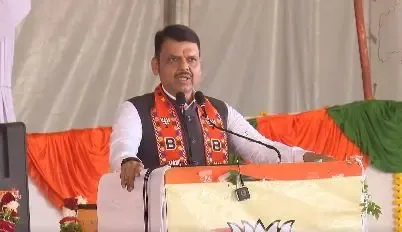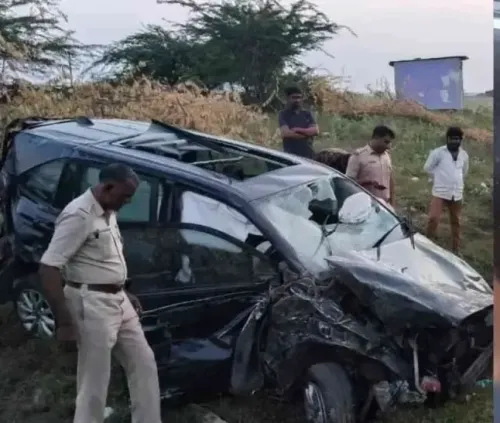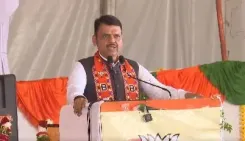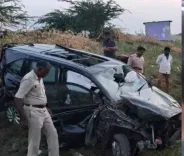Is Sambhal Ready for the Anniversary of Violence?
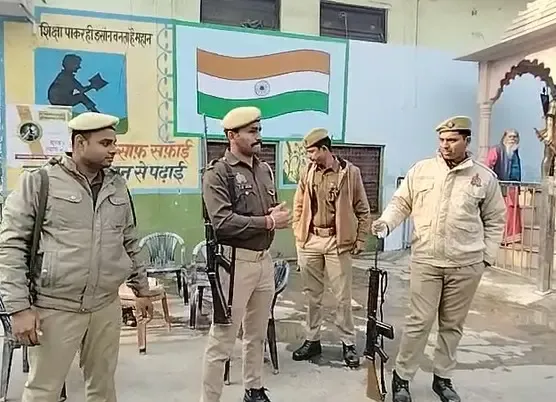
Synopsis
Key Takeaways
- Heightened security measures are in place across Sambhal.
- The Jama Masjid survey has reignited tensions.
- Community protests have escalated into violence.
- Historical claims regarding the mosque continue to fuel controversy.
- Authorities are aiming to maintain peace amidst rising fears.
Sambhal, Nov 24 (NationPress) The police and local administration are on heightened alert as today marks the first anniversary of the violent clashes that erupted during the survey of Jama Masjid in the city. Security protocols throughout the district have been reinforced, and vigilance has significantly increased. The police force remains highly prepared, with additional units deployed in areas that experienced unrest last year.
CCTV surveillance has been established at the violence site and surrounding locales. All cameras are actively monitored from the control center at Satyavrat Chowki near the mosque. Officers are consistently analyzing footage and coordinating with field teams to guarantee readiness for any potential incidents.
Sambhal Police have instituted a comprehensive security strategy. Patrols are being conducted by RAF detachments, PAC personnel, and local police throughout the area. Extra forces are stationed at various sensitive sites. Officials indicate that these actions are aimed at maintaining public order under all circumstances.
The Jama Masjid in Sambhal was constructed during the rule of the first Mughal emperor, Babur, between 1526 and 1530. The mosque has been the focus of controversy after advocate Vishnu Shanker Jain and others filed a court petition, asserting that the mosque was built on the remains of a temple dedicated to Lord Kalki. Jain, who is also involved in the Gyanvapi and Krishna Janmabhoomi cases, claimed that the mosque was erected following the destruction of a temple during Babur’s invasion in 1526–27. Historical texts like the Baburnamah and Ain-e-Akbari were cited to support the assertion.
In response to the petition, the court mandated a survey of the mosque on November 19, 2024. Advocate Commissioner Ramesh Raghav, along with district administration and police officials, conducted the survey that same day. The rapid proceedings faced backlash, with critics alleging judicial overreach and procedural flaws.
The Muslim community, including the management committee of the Jama Masjid, vehemently opposed the survey, referencing the Places of Worship Act, 1991, which prohibits changes to the status of any religious site as it existed on August 15, 1947. Ziaur Rehman Barq, the Samajwadi Party MP from Sambhal, denounced the actions, labeling them a threat to communal harmony.
On November 24, tensions escalated as a second survey was planned. Protests broke out near the mosque, with hundreds of locals gathering in fear of a repeat of the Babri Masjid demolition. The demonstrations soon turned violent, with protesters hurling stones and setting vehicles ablaze.
Numerous vehicles were set on fire, and property around the mosque suffered damage. Internet services were suspended, prohibitory orders were enacted, and schools closed for a day to avert further unrest.
Importantly, Sambhal is of religious significance to Hindus, as it is believed to be the birthplace of Kalki, the final avatar of Vishnu. Hindu scriptures indicate that Kalki will emerge in Sambhal to conclude the Kalyug, the age of moral decay. Earlier this year, Prime Minister Narendra Modi laid the foundation stone for the grand Kalki Dham, asserting that Kalki's arrival would “shape the course of thousands of years.”

